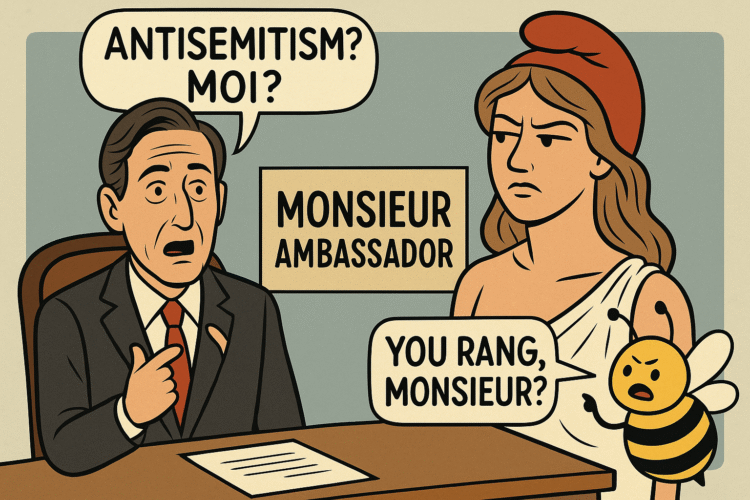
A Satirical Dispatch from the Franco-American Diplomatic Stage
On August 24, 2025, the world witnessed an increasingly rare diplomatic full-stop: France summoned U.S. Ambassador Charles Kushner after he penned a blistering open letter to President Macron. In the Wall Street Journal, Kushner accused France of failing to adequately stem a rise in antisemitism, linking it to France’s stance on Israel and discussion of recognizing a Palestinian state.
The summons was a classic French “mais voyons” moment—where formality meets fury. The French foreign ministry swiftly deemed the accusations “unacceptable,” emphasizing that mobilizing against antisemitism isn’t optional—it’s already their overture, not their contretemps. And yes, calling out France through a globally distributed editorial is about as subtle as serving caviar with a chainsaw.
Act I: The Op-Ed That Crossed Champagne and Lines
Kushner’s letter, dripping with familial gravitas—“I have Jewish grandchildren, I know how he feels about antisemitism”—was delivered not via secure diplomatic pouch but in the high-visibility packaging of the Wall Street Journal. He asserted that public debate over Palestinian state recognition “emboldens extremists,” and that anti-Zionism equals antisemitism.
At that moment, America’s envoy in Paris went from policy whisperer to media megaphone. The pièce de résistance: demanding Macron enforce hate-crime laws with urgency that would impress even the French interior minister.
Act II: The “Unacceptable” Riposte
France responded in trademark fashion—glaciated allusions and constitutional precision. The ambassador’s remarks were branded a violation of Vienna Convention protocol, the sacred marital contract of diplomatic discretion. In essence: “Mon cher envoyé, this is interference, not internal dinner conversation.”
A summons followed, complete with the sort of protocol-led stern nudge that Paris reserves for misbehaving partners at international soirées. And yet, hidden beneath the hierarchy of rebukes is a geopolitical tremor: tensions over Mideast policy, memory politics, and a once-indispensable transatlantic alliance.
Act III: The Spoiler: U.S. State Endorses the Roast
Despite the invitation to wax diplomatic, Washington doubled-down. A State Department spokesperson—protecting his and Kushner’s brand—praised the ambassador as doing a “great job advancing U.S. interests.” The ploy was clear: let France fume, while the U.S. flips the diplomatic script like a Senate-approved pancake.
It’s a textbook contrast: France doubles as offended host and protector of the Enlightenment. The U.S. doubles as the insulted guest—and the one blocking the exit.
The Subtext in the Room
This spectacle isn’t just cable-bait. It’s a sleight-of-hand geopolitical shuffle:
- France: balancing Jewish civic safety and values of solidarity with Palestine. Macron plays mediator to a nation fractured by identity and tragedies.
- U.S. (via Kushner): broadcasting elite family sensitivities about antisemitism, amplifying narratives that center Israel’s victimhood as universal.
It’s a clash of narratives: France claims active koshering of antisemitic attackers. The U.S. envoy suggests otherwise—and then makes it public policy theater.
Satirical Caveat
If I were doing satire here, the script would go:
Scene: Ambassador Kushner pens a high-minded but tone-deaf op-ed.
France: Summons him formally while sipping a grimy café noir.
U.S.: Says he’s doing “a great job,” starring in the diplomatic version of The Real World: Paris.
But this is not parody. The roast has already happened in front of diplomatic staff, popes of protocol, and a live global press.
The Bee’s-Eye View
Perched above the carved halls of the Quai d’Orsay, the cartoon bee holds a placard:
“When diplomacy gets flashy, someone forgot the invisible handshake.”
Kushner stands in the spotlight, Macron in his mind palace, and we’re watching a generational spat played out with all the glitter of an Instagram breakdown.
Final Sting: Champagne, Not Caviar
This episode isn’t just a diplomatic faux pas; it’s a lesson in narrative power—how you weaponize familial identity, how you interrupt domestic optics with foreign press, and how quickly a once-gilded ambassador becomes the punchline of international protocol.
It is, in manic French terms, a public slap with white gloves.
Friends, in 2025 even diplomacy is performative. And here’s the bitter truth: the strongest alliances can crumble under the pressure of an op-ed, and the quietest revolutions begin with a summons.